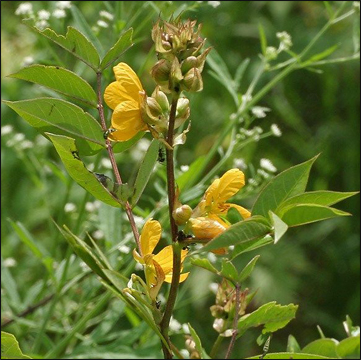What are the Uses and Health Benefits of Coffee Senna (Cassia occidentalis)?

What is Coffee Senna (Cassia occidentalis)?
Herbs have been used in traditional systems of medicine and as pharmacopoeial drugs since ancient times. Herbs possess a variety of phytopharmaceuticals which play a vital role in agriculture, human health etc. Therefore, it is important to have sufficient knowledge about herbs not only because of their immense health benefits.
Although in traditional medicine Cassia species are well known for its laxative properties and for the treatment of various skin diseases as well. It belongs to the family Caesalpiniaceae. This plant usually grows in southern parts of India.
Names in Different Languages
- Hindi Name: Kasoundi
- English Name: Negro Coffee, Coffee Senna, Styptic weed
- Urdu Name: Kasonji
- Sanskrit Names: Kasamarda, Arimarda (relieves pain), Kasaghana (relieves cough), Karkasha etc.
- Botanical Name: Cassia occidentalis

(Reference: Astang Hridyam Sutrasthanam, Chapter No. 6, Shlok No. 100)
Meaning: According to this shloka, kasamarda cures the diseases caused by worms, increase of kapha (cough) and regulates the bowels.
What are the Medicinal Properties of Cassia occidentalis?
- Taste: Katu (pungent), Tikta (bitter) and Madhura (sweet)
- Vipaka: Undergoes pungent taste conversion after digestion
- Potency: Hot
- Effect on Tridosha: Balances all the three doshas but mainly balances Kapha and Vata dosha due to hot potency. Due to its strong and bitter properties, it acts as 'Pitta Saraka' which means it lets Pitta out of the body.
- Part Used: Roots, leaves and seeds
Chemical Constituents
Phytochemical screening of the plant showed that it is a rich source of carbohydrates, saponins, flavonoids, resins, sterols, alkaloids, terpenes, saponins, anthraquinones, balsam, glycoside, sterols etc. The presence of all these constituents shows that this plant has a great potential to be used as phytomedicine.
- Due to the presence of resins and flavonoids, this plant possesses anti-inflammatory properties.
- Due to the presence of alkaloids, it decreases blood pressure, balances mind and brain during mental illness.
- Tannins present in this plant help in wound healing and act as an anti-parasitic.
- Presence of terpenes suggests that it has anti-tumor and anti-viral properties.
- Saponins are believed to have anti-cancerous, anti-inflammatory, anti-oxidant and anti-viral properties.
- Anthraquinones have been reported to possess wound healing properties.
What are the Actions (Karma) of this Plant according to Ayurveda?
- Kasaghana (relieves cough)
- Mutrala (diuretic)
- Akshepa samana (anti-convulsant)
- Dipana (appetizer)
- Vatanumolan (pacifies Vata dosha)
- Jwarghana (anti-pyretic)
- Kustghana (beneficial in skin disorders)
- Vishaghana (acts as an antidote for poison)
What are the Therapeutic Uses of Cassia occidentalis?
Treats Cough
The Sanskrit name of this herb is 'Kasamarda'. The word 'Kasa' means cough and 'Marda' means to end or to cure. Hence, this herb is a drug of choice for different kinds of coughs.
- The leaves of this plant are mixed with honey for alleviating cough where Kapha dosha is predominant.
- The decoction of its flowers in a dose of 20 ml once or twice a day is useful in the treatment of asthma.
Prevents Constipation
The seeds of Cassia occidentalis are widely used for various therapeutic purposes.
- It contains anthraquinone which has purgative action.
- Drinking tea prepared with cassia seeds regularly helps in keeping the large intestine well hydrated and facilitates the bowel movement.
Combats micro-organisms
Cassia seeds can inhibit the growth of micro-organisms and prevents the growth of differential bacterial strains like Bacillus diphtheriae, Staphylococcus etc.
- Mixing cassia seeds in drinking water helps in curing all kinds of infections triggered by fungi.
Skin Infections
The paste of seeds and leaves is applied over skin lesions, ulcers, ringworm, herpes, infection etc.
- The paste of root of this plant is mixed with lemon juice and applied on eczema and psoriatic patches.
- The paste of the root of Cassia occidentalis plant mixed with cow ghee should be taken internally in filaria.
- The seeds of Kasamarda and radish mixed with Gandhaka are an excellent remedy for sidhma kusta (psoriasis).
Urinary Infections
The decoction of this plant is useful for the treatment of urinary retention, dysuria and other inflammatory conditions.
As a Substitute for Coffee
The seeds of this plant are roasted and powdered to prepare coffee that's why it is also known as Negro Coffee or Senna Coffee.
- Roasting destroys the purgative property of these seeds.
- This coffee is used as a substitute for coffee and also acts as a tonic for asthma, convulsions and hysteria.
Other Uses
- Its seeds are used in the treatment of whooping cough, diseases of heart etc.
- The paste prepared from the leaves of this plant should be taken in the dose of 1 gm twice a day is very useful in colic pain.
- Its bark infusion is useful in diabetes.
- In Chicken Pox, Kasamarda leaves, neem leaves, sandalwood, khus khus grass should be boiled in water and used for bath.
- The roots of this plant are used in intermittent fevers, as a tonic and diuretic.
- In piles, dry the roots of this plant and ground to make a powder and take this herb in a dose of 5 grams. The powder of its seeds should be taken in a dose of 2 grams for a week.
- In snake bite, 10 gm root powder of its plant is chewed thrice a day for three days.
Contraindications
It is not indicated in people suffering from diarrhea.



